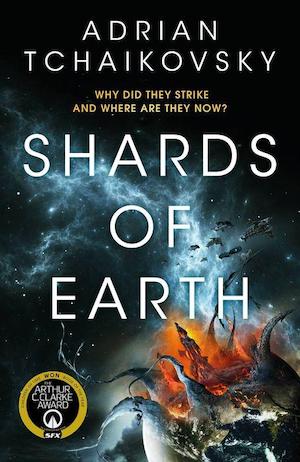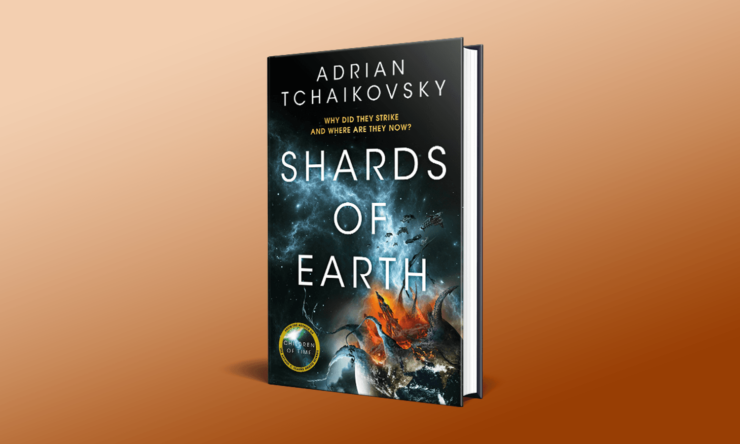“Go back where you came from” is a common phrase used by far too many towards immigrants and refugees. It is the fear, hatred and distrust of The Other. This hatred seems to be particularly sharp toward certain groups of refugees, those who have traveled hundreds of miles to escape war or privation, turning up at a distant border, seeking to rebuild their lives elsewhere.
But what if you can’t go where you came from? What if your entire home planet—Earth—and others have been turned from habitable worlds to extremely strange and warped works of “art”? And, after a miracle ends the threat of worlds destroyed, there are precious decades of peace during which people no longer have a “go bag” packed in case the enemy should show up? Peace to the point that you have not forgotten, but you have relaxed somewhat from the existential day to day terrors? A small peace, fragile, but peace nonetheless.
But, then, what if, after this period of peace, what if there were signs that the enemy might have come back? And what if you, part of the crew of a freelancing salvage spaceship, were at ground zero for this discovery, with forces across interstellar space very interested, and fearful, and avaricious, of what you may have found? They might be willing to kidnap you, or chase you across solar systems, or just outright kill you. Or perhaps just start an interstellar war. This is the world and story of Adrian Tchaikovsky’s Shards of Earth.
The author brings together the uneasiest of found families on board the wandering salvage ship, the Vulture God. The center of the ship is Captain Rollo, trying to keep his ship and crew together. There is also Olli, born without limbs, but fearsome and indispensable while controlling an exoskeleton frame called Scorpion; Barney, the engineer keeping the hunk of junk flying; Kris, the lawyer, important for things like contracts and salvage; Kittering, one of those Hannilambra aliens who keeps the Vulture God flying, financially; and the mysterious Solace, a Partheni warrior princesses—what her deal is, is a very good question. It’s an often prickly found family, but I think those are the best found families to read about.
Buy the Book


Shards of Earth
But I didn’t mention Idris in this mix. Idris is a navigator and pilot now, but once he was converted into an Intermediary, changed in an effort to duplicate the original miracle that got one of the Architects to turn away from an inhabited planet. He was an Intermediary that saved lives—a whole world, even. But such a role takes a horrendous mental toll on a person. Such a toll that, even with the threat of the architects receding in the past decades, is still immense. Is it any wonder that Idris is now just a Navigator on a junk ship on Rollo’s crew? Until circumstances bring his old career, his old life, his old role, back again, whether he wants it or not.
The author uses the full wide screen of space opera conventions to tell this story in a way not even his award winning Children of Time does, with a wide variety of worlds, ideas, and aliens. The choice of worlds that humans have fled to in the wake of the destruction of Earth (and other human worlds too) ranges from rich worlds which have everything to lose should the Architects return, to very hardscrabble worlds that man would have never colonized extensively to begin with, had the invaders not come. We get a good tour of a number of systems, of ways the refugees of Earth have lived in the wake of Earth’s fall. It is an inspired choice, rather than the aliens blowing up Earth for the lols, or for water, or for food or for anything else, they simply changed it into an alien, unlivable sculpture.
And on those aliens: readers of the author’s previous work are expecting, perhaps hoping for some rather exotic aliens, or aliens that involve insects or other arthropods. Shards of Earth includes these types of aliens, and one in particular becomes an adversary for the crew of the Vulture God. The Essiel, an imperium of aliens in an empire of different species that promises protection in exchange for subservience, reminded me of the Shaa from Walter John Williams’ Dread Empire verse. And of course, there are the Architects themselves, only seen as their gigantic worldships, remaking worlds for their own purpose.
And within the crew itself, both Kittering the Hannilambra are not human. In addition, Solace, of the all women Partheni (think Parthenogenesis) who are both revered and feared by other refugees of humanity, is considered to be somewhat alien as well. Myrmidon Solace is one of our viewpoint characters, and while she is unusual for a Partheni in being an agent working outside of their space instead of the straight up warrior she once was, she does provide a view into their world and culture as much as, say, Kittering does for the Hannilambra. Then again, too, Idris is a bit alien himself, having been sculpted into his role as Intermediary, to turn away Architects. Is it any wonder he fled to work with a scavenger ship and tried to forget his traumatic past, and the author does a great job with his trauma and mindset when it seems that the Architects are back. Although there is a wide cast and a number of other points of view, Idris could be considered the primary lead character, as we do spend a lot of time with him, and in his mind.
Earth being destroyed and leaving the rest of humanity behind is done in an interesting and unique fashion in Shards of Earth. It’s not a new idea to make the remnants of Earth’s population refugees; it’s an idea that has been explored by authors like Greg Bear in Anvil of Stars where aliens destroy Earth (in a far less artistic manner than in Shards of Earth), and Wil McCarthy in Queendom of Sol series where Earth is destroyed by a black hole. The societies and remnants of humanity in these novels vary wildly in scale and size.
Although Tchaikovsky’s characters are fleeing from Earth, not to it, both iterations of Battlestar Galactica come to mind.1 Matters may be more dire in BSG than in Shards of Earth—since there are seemingly few or no worlds left for humanity save for the mythical and perhaps chimerical Earth—but the people, and by extension societies and governments, show the same signs of stress and trauma. And of course both works have the overhanging threat of extinction hanging over the refugees and survivors heads.
A message of Shards of Earth and other stories that deal with unwilling diasporas is this: it is a permanently traumatic experience, one that marks those who go through it and those who follow thereafter in their wake. Compassion, understanding, and offering humanity and solace to those who have undergone such an experience is among the highest of human ideals. In a world today where there are more displaced refugees from their home country than ever, that is a message to be learned and to be inculcated. Be they refugees from war, disease, famine, economic privation, or aliens remaking planets, turning away refugees is to turn away a part of one’s self. And to keep in mind the trauma of their experience and to empathize is the height of kindness.
The center cannot hold, and while mere anarchy is loosed upon the world, the story of this post-Earth interstellar society and the return of an enemy gone for decades is only the beginning. It’s a good enough ending point in this novel, this chapter of the story is complete, but it is clear there is much more to tell about the return of the Architects, and the crew of the Vulture God. I look forward to the sequels.
Shards of Earth is available from Orbit Books.
An ex-pat New Yorker living in Minnesota, Paul Weimer has been reading sci-fi and fantasy for over 30 years. An avid and enthusiastic amateur photographer, blogger and podcaster, Paul primarily contributes to the Skiffy and Fanty Show as blogger and podcaster, and the SFF Audio podcast. If you’ve spent any time reading about SFF online, you’ve probably read one of his blog comments or tweets (he’s @PrinceJvstin).
[1]Readers might wonder why I choose to name check BSG here instead of a possibly more obvious SF series parallel of a world where Earth is lost, where a ramshackle found family of a crew (at least one with unusual powers) on a ramshackle ship tries to make their way with mysterious threats hanging over their heads.. You can’t take the sky from me, but you will forgive me as that particular show has been discussed endlessly, elsewhere.











I’m reading this right now. I think it’s great.
This is a fantastic cat squasher of a book and I loved every page of it. It isn’t a stand alone but is the next best thing to it.
Read this a few weeks ago (long enough that my stupid brain forgot when exactly and assumed this was a sequel). Some very interesting world building and Adrian has let his ideas run wild in populating his universe.
I especially like his universes answer to FTL which has more than a whiff of Warhammer 40k about it but the description of what it’s like for Idris as the pilot is nicely creepy and makes the hairs on the back of your neck stand up.